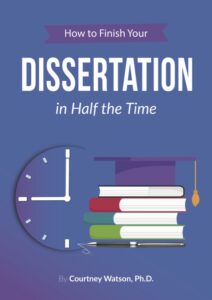While every part of a dissertation is important, some of the hardest sections to write occur at the beginning. Two early sections of the dissertation–or any scholarly project–are the abstract and the introduction. While there are some similarities between the two, the abstract and the introduction to a dissertation are distinct pieces of writing that require different approaches and perspectives.
As a writer, there are many considerations to take into account when writing a dissertation abstract vs. introduction, and at first it can seem confusing to differentiate between the two. When thinking about both documents, it’s a good idea to consult with your dissertation chair to discuss any conventions that may be standard for your department or university. Also look at successfully defended dissertations written by recently graduated colleagues to see examples from your program.
Frequently asked questions about writing an abstract vs. an introduction
- What is an abstract?
- How long is an abstract?
- What is a dissertation introduction?
- What is the difference between an abstract vs. an introduction?

What is an Abstract?
Before we get into the difference between an abstract vs. introduction, let’s explore each of them on their own. An abstract is a brief, succinct overview of your dissertation project. It offers a clear summary of the broad strokes of your dissertation, including a bit of background, the central research question, the methods used to carry out the research, and the general tenor of the results. It’s a 30,000-foot view of your dissertation, distilled to its most finite point. If your dissertation was a film, this is the highlight reel.
The purpose of an abstract is surprisingly utilitarian, given the lengthy nature of dissertations. Abstracts are a great scholarly tool, and they are designed to ease the burden of the research process. The clear and concise nature of abstracts, which appear at the very beginning of a manuscript as part of the bibliographic entry, makes them easy to read quickly while sorting through large quantities of research. Also, abstracts typically include five or six key words to be used as search terms at the end of the abstract, which also aids in research.
As a researcher, I love abstracts. They are the perfect form for winnowing down searches on academic databases, making it easy to see which articles and books I need to download and read, and which ones I can skip. This is especially useful for deep dives into scholarly databases like JSTOR, which can return thousands of entries when given two or three search terms. Abstracts are also great for guiding more advanced, specialized searches. When you are writing your abstract, keep its purpose in mind.

How Long is an Abstract?
One of the basics to know about abstracts is that they are short: 100-150 words, max. Some journals ask for 50-word abstracts, but for dissertations, it is usually 150 words. This is a good thing, because abstracts can be difficult to write. After completing 100+ pages of a doctoral dissertation, it would seem that another 150 words would be no sweat, right? Not so fast. As with all things in academia, it’s a bit more complicated than that.
Abstracts have a very specific job, and that’s what can make them a challenge to write. It’s no easy feat to condense hundreds of pages of research and writing into a short, compelling summary, but that’s exactly what good abstracts do. When writing your abstract, think about how you might explain the primary goals of your dissertation if you only had one minute to do so. In this way, the abstract is basically a synopsis of your dissertation.
What is a Dissertation Introduction?
While the abstract is usually the final part of your dissertation to be written, the dissertation introduction is often the first. As the first chapter to your dissertation, the introduction is a sometimes lengthy document (10-15 pages) that offers an overview of the research project and familiarizes the reader with the scope and purpose of your dissertation research.
The dissertation introduction covers a lot of ground, and as a researcher it gives you an opportunity to dive into your topic. The introduction is the place to explore the impetus for your research. Why this topic? What is the driving force giving this area of study urgency and momentum? Why now? These are all great questions to discuss in your introduction as you are contextualizing your project’s place in the scholarly landscape.

In the dissertation introduction, you will also define the boundaries of your research and explain the purview of your scholarship. For instance, when I was writing my dissertation introduction on tourism and southern writers, I took care to explain why the locus of my research was the American South and modernist, expatriate writers. These were all elements that needed to be clarified early in the dissertation so my research objectives were clear to the reader.
Abstract vs. Introduction
So what is the fundamental difference between an abstract vs. an introduction? Both the abstract and the introduction are vital parts of your dissertation and they play different roles in the document. They also exercise separate scholarly muscles and require very different approaches. While the introduction to your dissertation opens up the entire world of your research to the reader, and can therefore be lengthy, the abstract to your dissertation demands restraint: just the facts, please.
As a scholar, I can say from personal experience that writing an abstract is tough. With an introduction or an article, there is room to spread out and even wander a bit, but in an abstract, every word matters. I look at each word as a pricy piece of real estate on the page, and every sentence needs to do its part to tell the story of my project. Therefore, the abstract needs to be clear, focused, and have a spark that makes the reader say, “That’s interesting, I’d like to read more.”
As you are writing your dissertation, make note of specific sentences that encapsulate the goals and purpose of your research, as well as keywords that you use frequently in your own database searches. These will come in handy later on when you’re wondering what is absolutely essential to include in your abstract. Don’t forget, someday soon there will be scholars citing your research!






